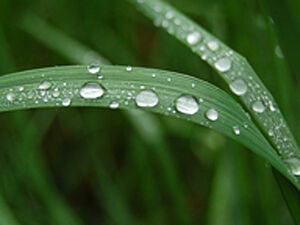Many groundwater bodies in Germany are in poor ecological condition, one of the reasons being substance inputs from agriculture.
Organic farming is a land use concept that contributes demonstrably and in many ways to the protection of groundwater and surface water (e.g. Sanders & Heß 2019). The use of synthetic chemical pesticides is prohibited in organic farming, animal husbandry is limited to a certain area, and the purchase of nitrogen fertilisers and the use of veterinary medicines are strictly regulated. As a result, the contamination of groundwater with nitrates, pesticides and veterinary medicines is considerably reduced in organic farming, i.e. it is possible to use the land productively for agricultural purposes while at the same time minimising contamination of the underlying groundwater body.
Even in organic farming, nitrate leaching is not completely avoided, and further measures must be taken, especially in regions with less precipitation and in dry periods. For example, potential nitrogen inputs from the cultivation of legumes and from unproductive nitrogen mineralisation after tillage in autumn should be mentioned.
A restrictive approach to the proportion of root and vegetable crops, adapted intercropping, largely reduced tillage in autumn and targeted mineralisation management with regard to legume cultivation can counteract this. In addition, further measures have recently been developed in practice and research that can counteract nitrate discharges in the sense of a further development of organic farming.
The goals in the area of water protection through organic farming are therefore, among others
- To examine the influence of organic farming on groundwater quality and how the regional measured values in water catchment areas change spatially and temporally;
- to collect information and scientifically sound data in practice on the influence of further developed and water-saving cultivation methods such as mulch or strip cropping systems with regard to mineralisation management and thus groundwater protection;
- to record obstacles to conversion and to develop strategies to bring organic farming as a groundwater-conserving cultivation method, including its further development, more strongly into the field;
- to design effective concepts for water utilities on how to plan and implement resource protection and organic farming in their extraction areas and to describe how the "dual" use (land use by agriculture and water management) can be facilitated even better and more sustainably;
- to ensure the transfer and monitoring of these results into the practice of water utilities as well as agricultural practice and to political decision-makers.
One example of our work for active groundwater protection is the initiative Wasserschutzbrot (Water Protecting bread) (www.wasserschutzbrot.de). Conventional farmers refrain from late nitrogen fertilization for the cultivation of quality wheat. This reduces nitrate leaching into groundwater. Mills from the surrounding area grind the "water protection wheat" into "water protection flour". Family-managed, artisan bakeries bake "Wasserschutzbrot" from it.
Another was the feasibility analysis "Ways to more organic farming and groundwater protection in southern Hesse" was to develop model strategies for the region of southern Hesse which would enable conventionally working farms to enter as easily as possible into a groundwater-conserving way of farming and which would aim at a long-term conversion to organic farming.




